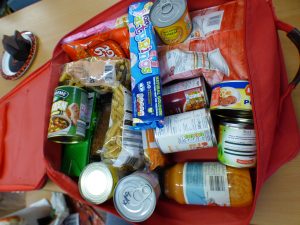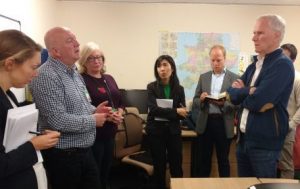In which Oral History Collective member Alison Atkinson-Phillips does not offer an opinion on the destruction of that statue in Bristol.
Author Archives: Alison
From Stockton to Jarama: Recalling those who fought Franco’s fascists from the North East
Matt Perry reviews Northern Stage‘s recent production of The Ballad of Johnny Longstaff
Continue readingFed Up: the Sonic Narrative
Sound Artist, Sound Designer, and Abstract Composer Matthew Tuckey reflects on the creation of an abstract sound composition in response to the Oral History Unit & Collective’s research with the Newcastle West End Foodbank.
Continue readingMutinous Memories and Survivor Memorials: Report on Collective book launch
A sizeable audience gathered in the Armstrong Building on Wednesday 5 June for the joint launch of two exciting new publications by members of the Oral History Unit & Collective: Research Associate Alison Atkinson-Phillips’s Survivor Memorials: Remembering Trauma and Loss In Contemporary Australia (University of Western Australia Publishing) and Reader in Labour History Matt Perry’s Mutinous Memories: A Subjective History of French Military Protest in 1919 (Manchester University Press). Jack Hepworth reports.
Deindustrialisation, heritage and memory: Reflections on 2018-2019 network
Deindustrialisation, and the understanding of how it continues to reverberate through working-class communities, is a relatively new but growing interdisciplinary field. Alongside academic interest, community activist groups, heritage organisations, trade unions and artists are engaged in examining the impact of structural economic change. The Deindustrialisation, Heritage and Memory Network came together through three workshops – held in Glasgow, Newcastle and Canterbury – which brought together research from across academia and the heritage sector, offering an important space where significant and lasting connections have been made. In this post, network contributors Paul Barnsley and Emma Copestake reflect on their experiences of the workshops, and consider future directions in the field.
Foodbank Histories: Placement Reflection by Jack Hepworth
Foodbank Histories is a collaborative project between Newcastle West End Foodbank, Northern Cultural Projects, and Newcastle University Oral History Unit & Collective. The project began in 2018, recording approximately 30 short oral history interviews with foodbank clients, volunteers, and supporters. Over the past five weeks, PhD candidate Jack Hepworth has completed a short-term placement on Foodbank Histories, funded by the Newcastle University Social Justice Fund. Here he reflects on his experience.
Oral History in 2018: What did we learn?
The Newcastle Oral History Unit and Collective is celebrating its first full year of operation with our Annual Public Lecture in March. As with any new venture, it has been a year of learning, and an important part of that has been figuring out where we fit into the world of oral history. To help us with that, we made sure at least one member attended each of the four large oral history conferences held in Europe and North America in 2018*, to get a sense of the ‘state of the field’ that we are a part of. So, what have we learned?
“I was born poor, and I will die poor”: Reflections on disability, ill health and poverty in the age of Universal Credit

This Disability History Month, Silvie Fisch, director of Northern Cultural Projects and associate researcher with the Oral History Unit & Collective, shares some of the stories she heard during our Foodbank Histories project and reflects on the interconnections between disability, ill health and poverty in the age of Universal Credit.
Foodbank Histories meets the United Nations

When the United Nations Special Rapporteur for Extreme Poverty visited the Newcastle West End Foodbank in Wednesday, the Oral History Collective was invited along to share some of the research findings from our six-month Foodbank Histories project, a partnership with Northern Cultural Projects. This work is also part of the Being Human festival, 15-24 Nov. So why is it important?
Oral History Unit: Collective to host national Oral History gathering
We are excited to be hosting oral historians from around the UK for the annual Oral History Society (OHS) regional networkers’ gathering next weekend. The event will begin on Friday 26 October with a special seminar from Dr Rob Perks, director of National Life Stories at the British Library. Saturday’s program focusses on the challenges and opportunities of partnership working and the afternoon will be opened to non-members.
